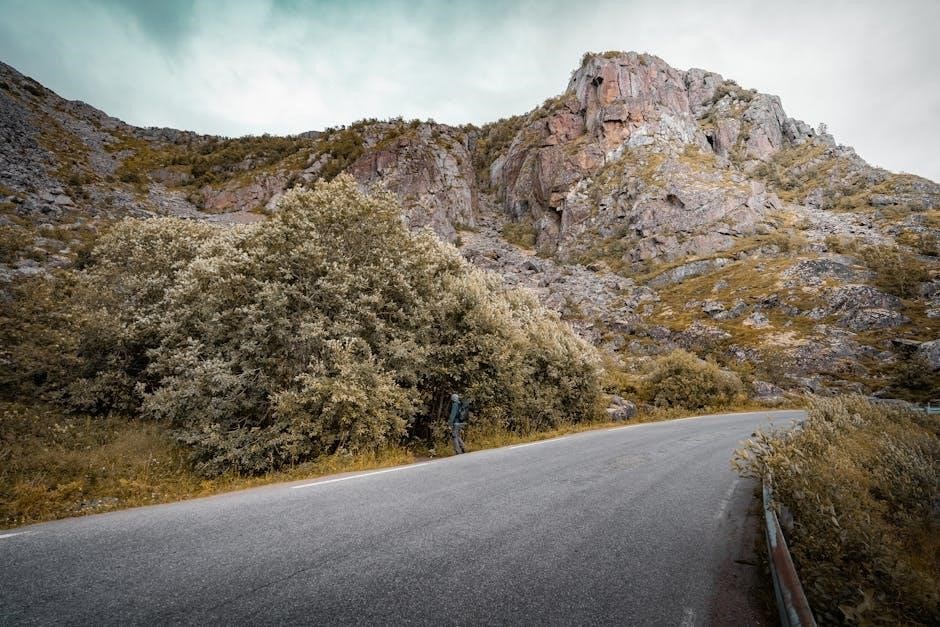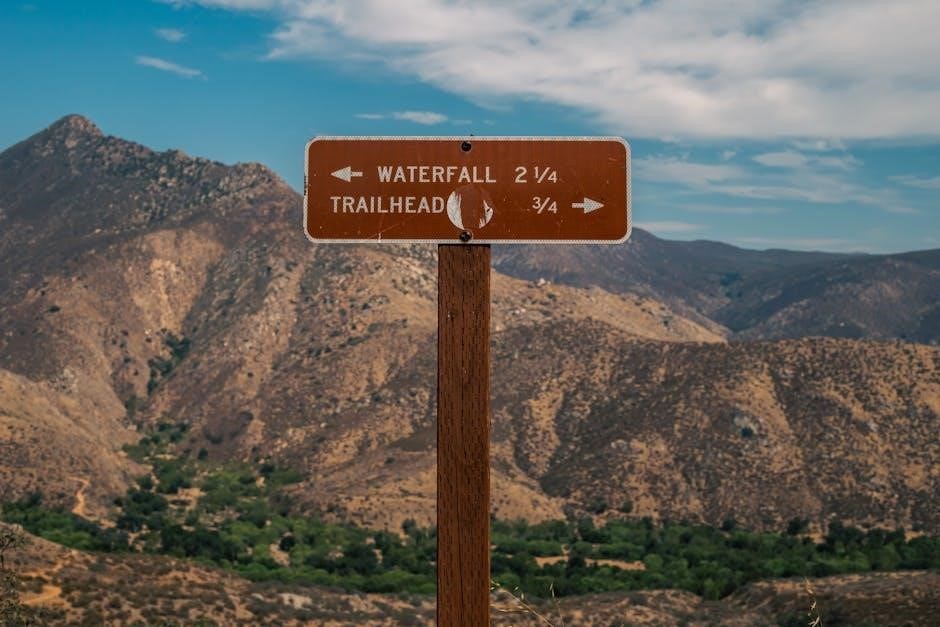how to become a mountain guide
Mountain guiding is a demanding yet rewarding profession requiring exceptional leadership‚ extensive expertise‚ and a deep passion for the outdoors. Guides must possess advanced navigation‚ risk assessment‚ and group management abilities to ensure safe and successful expeditions in diverse terrains and conditions. It offers unparalleled opportunities to connect with nature and inspire others through shared mountain experiences.
1.1 Understanding the Role of a Mountain Guide
A mountain guide is responsible for leading climbers and outdoor enthusiasts safely through challenging terrains‚ ensuring their well-being and success. The role demands extensive knowledge of navigation‚ weather patterns‚ and risk management. Guides must also possess strong interpersonal skills to manage group dynamics and provide mentorship. Their expertise in technical climbing‚ skiing‚ and wilderness survival is crucial for overcoming obstacles and making informed decisions in high-stress environments.
1.2 Importance of Certification and Training
Certification and training are essential for mountain guides to ensure safety‚ competence‚ and professionalism. Programs like the IFMGA certification provide a rigorous framework for mastering technical skills‚ risk management‚ and leadership. Proper training ensures guides can handle emergencies‚ make informed decisions‚ and adapt to diverse conditions. Certification also builds trust with clients and demonstrates a commitment to industry standards and continuous improvement in mountaineering practices.

Gaining Extensive Mountaineering Experience
Building extensive mountaineering experience requires logging countless hours in the wilderness‚ refining climbing and skiing skills‚ and gaining familiarity with diverse terrains and weather conditions over time.
2.1 Building Climbing and Skiing Skills
Mastering both climbing and skiing is essential for aspiring mountain guides. Begin by logging extensive hours in the wilderness‚ refining techniques‚ and adapting to varied conditions. Focus on developing proficiency in rock and ice climbing‚ as well as backcountry skiing‚ to build a strong foundation. Enroll in courses from reputable organizations like the AMGA to enhance skills and gain confidence in diverse mountain environments.
2.2 Logging Hours in the Wilderness
Accumulating extensive wilderness experience is crucial for developing the practical skills needed to become a mountain guide. Spend countless hours climbing‚ skiing‚ and navigating diverse terrains to build familiarity with varying conditions. This hands-on exposure fosters adaptability‚ enhances decision-making‚ and deepens your understanding of mountain environments‚ ultimately preparing you for the challenges of leading groups safely and effectively in remote settings.
Meeting Prerequisites for Certification
Meeting certification prerequisites involves gaining extensive mountaineering experience‚ demonstrating advanced climbing skills‚ and showcasing proficiency in wilderness navigation and safety protocols essential for guiding.
3.1 Entry Requirements for Guide Training Programs
Entry into guide training programs typically requires applicants to meet specific criteria‚ such as minimum age‚ medical fitness‚ and completion of basic first aid training. Candidates must demonstrate proficiency in navigation‚ rope work‚ and crevasse rescue techniques. Many programs also require extensive experience in climbing‚ skiing‚ or wilderness travel‚ ensuring a solid foundation for advanced training.
3.2 Passing the Entry Exam
Passing the entry exam is a critical step in advancing to guide training programs. The exam assesses both theoretical knowledge and practical skills‚ such as navigation‚ weather interpretation‚ and safety protocols. Candidates must demonstrate proficiency in rope work‚ crevasse rescue‚ and emergency response techniques. Thorough preparation and hands-on experience are essential to succeed‚ as the exam evaluates a candidate’s readiness for the demands of mountain guiding.
Completing the Aspirant Guide Course
The Aspirant Guide Course provides foundational training in essential mountain guiding skills‚ combining theoretical knowledge with hands-on experience under the supervision of certified professionals.
4.1 Overview of the Basic Training Program
The basic training program equips aspiring guides with foundational skills in mountain navigation‚ rope work‚ hazard assessment‚ and group management. It combines classroom instruction with field exercises‚ focusing on safety protocols and practical applications. Participants learn essential techniques for leading climbs and managing risks‚ ensuring a solid framework for advancing to more specialized training and real-world guiding scenarios under supervision.
4.2 Practical Learning with a Supervisor
Practical learning with a supervisor involves hands-on experience in real mountain environments. Aspiring guides work alongside certified professionals‚ gaining insights into decision-making‚ client management‚ and safety protocols. Supervised training includes leading climbs‚ navigating complex terrains‚ and handling emergencies; This phase bridges theoretical knowledge with practical application‚ ensuring guides develop the confidence and competence needed for independent leading‚ while receiving constructive feedback to refine their skills.

Obtaining IFMGA Certification
Obtaining IFMGA certification is the ultimate step in becoming a professional mountain guide. It requires advanced training‚ rigorous assessments‚ and demonstrated expertise in mountaineering. Recognized worldwide‚ it signifies exceptional skill‚ leadership‚ and commitment to safety protocols;
5.1 Advanced Training and Assessment
Advanced training involves mastering high-level mountaineering techniques‚ including complex climbs and backcountry skiing. Assessment evaluates skills in navigation‚ risk management‚ and decision-making under real-world conditions. Guides must demonstrate expertise in diverse terrains and weather‚ ensuring they can lead safely and effectively. This rigorous process confirms their ability to handle challenging situations and make sound judgments‚ critical for IFMGA certification.
5.2 Work Experience and Traineeship
Following advanced training‚ aspiring guides engage in supervised work experience‚ leading climbs and expeditions under mentorship. This hands-on phase refines decision-making and client management skills. Traineeships provide practical exposure to real-world challenges‚ ensuring they can apply their expertise in diverse conditions. This step is crucial for developing the confidence and competence needed to become a fully certified IFMGA mountain guide.
Developing Physical and Mental Fitness
Building physical endurance and mental resilience is essential for mountain guiding. Regular climbing‚ hiking‚ and skiing help develop strength and stamina. Mental toughness‚ focus‚ and decision-making under pressure are cultivated through experience and training‚ ensuring guides can lead safely and confidently in challenging environments.
6.1 Building Endurance and Strength
Consistent training is vital to develop the physical endurance and strength needed for mountain guiding. Activities like climbing‚ hiking‚ and skiing build cardiovascular fitness and muscular stamina. Incorporating strength training and high-intensity exercises enhances overall physical resilience. This foundation allows guides to navigate challenging terrains‚ carry heavy packs‚ and assist clients during long‚ demanding expeditions‚ ensuring both personal and client safety in the mountains.
6.2 Cultivating Mental Toughness and Decision-Making Skills
Cultivating mental toughness and decision-making skills is essential for mountain guides. They must remain calm under pressure and make quick‚ informed decisions to ensure safety. Guides develop these abilities through experience‚ training‚ and learning from mentors. Mental resilience is built by facing challenges and overcoming obstacles‚ while decision-making skills are honed through practice and understanding risk management principles. These qualities are vital for leading expeditions successfully.

Mastering Technical Skills
Mastering technical skills is crucial for mountain guides‚ including advanced climbing and skiing techniques‚ navigation‚ and risk management. Continuous learning and hands-on practice are essential.
7.1 Advanced Climbing and Skiing Techniques
Advanced climbing and skiing techniques are essential for mountain guides‚ involving proficiency in ice climbing‚ crevasse rescue‚ and navigating challenging terrains. Guides must excel in both rock and ski disciplines‚ demonstrating precision and adaptability in varying conditions. Mastery of these skills ensures safe and efficient navigation‚ enhancing the guide’s ability to lead diverse expeditions effectively.
7.2 Navigation and Risk Management
Navigation and risk management are critical skills for mountain guides‚ requiring precise map reading‚ compass use‚ and GPS navigation. Assessing weather‚ terrain‚ and group capabilities ensures informed decision-making. Guides must identify potential hazards like avalanches‚ rockfall‚ and crevasses‚ employing strategies to mitigate risks and ensure group safety. Effective navigation and risk management are cornerstone competencies for leading successful and secure mountain expeditions.

Finding Mentorship and Guidance
Finding mentorship is crucial for aspiring mountain guides. Working with experienced guides provides valuable insights‚ skill refinement‚ and practical knowledge. Mentorship helps build confidence and decision-making abilities.
8.1 Working with Experienced Guides
Working with experienced guides offers hands-on learning and real-world insights. They share techniques‚ risk management strategies‚ and decision-making skills. Mentors provide feedback‚ helping you refine your abilities and gain confidence. This collaboration fosters a strong foundation for your guiding career‚ ensuring you learn from proven professionals in the field.
8.2 Learning from Industry Experts
Learning from industry experts provides invaluable insights into advanced techniques and best practices. Experts share their knowledge on safety protocols‚ route planning‚ and client management. Attending workshops‚ seminars‚ and certifications led by experienced professionals enhances your skills and keeps you updated with the latest industry standards‚ ensuring you deliver exceptional guiding services.
Staying Updated with Industry Standards
Staying updated with industry standards is crucial for mountain guides. Continuous learning and professional development ensure adaptability to new technologies and best practices‚ maintaining high safety and effectiveness in guiding.
9.1 Continuous Learning and Professional Development
Continuous learning and professional development are essential for mountain guides to stay updated with industry standards. Ongoing education refines skills‚ keeps guides informed about new techniques‚ and ensures they adapt to evolving technologies and best practices. This commitment to lifelong learning enhances safety‚ effectiveness‚ and the ability to lead successful expeditions in a constantly changing outdoor environment.
9.2 Adapting to New Technologies and Best Practices
Mountain guides must stay informed about advancements in technology and industry best practices. From improved navigation tools to enhanced safety equipment‚ adapting to these changes is crucial for efficiency and safety. Regular updates through workshops‚ forums‚ and industry resources help guides integrate new methods‚ ensuring they remain effective and informed in their profession‚ while maintaining high standards of safety and client care.
Final Thoughts and Next Steps
Becoming a mountain guide demands lifelong commitment to learning and growth. Embrace challenges‚ stay adaptable‚ and inspire others through your passion for the mountains and leadership excellence.
10.1 Commitment to Lifelong Learning
Continuous learning is essential for mountain guides to stay updated on safety protocols‚ advanced techniques‚ and environmental awareness. Pursuing certifications‚ attending workshops‚ and staying informed about new technologies ensures adaptability and expertise. Embrace a mindset of growth‚ seeking feedback and refining skills to maintain high standards and inspire trust in clients. Dedication to lifelong learning fosters resilience and excellence in this evolving field.
10.2 Pursuing Specialization in a Niche
Specializing in a specific area‚ such as rock climbing or backcountry skiing‚ allows mountain guides to deepen their expertise and cater to niche client demands. This focus enhances credibility‚ attracts specialized clients‚ and opens opportunities for advanced guiding roles. Specialization also fosters innovation and leadership within the guiding community‚ contributing to the evolution of mountain guiding practices and personal fulfillment.
